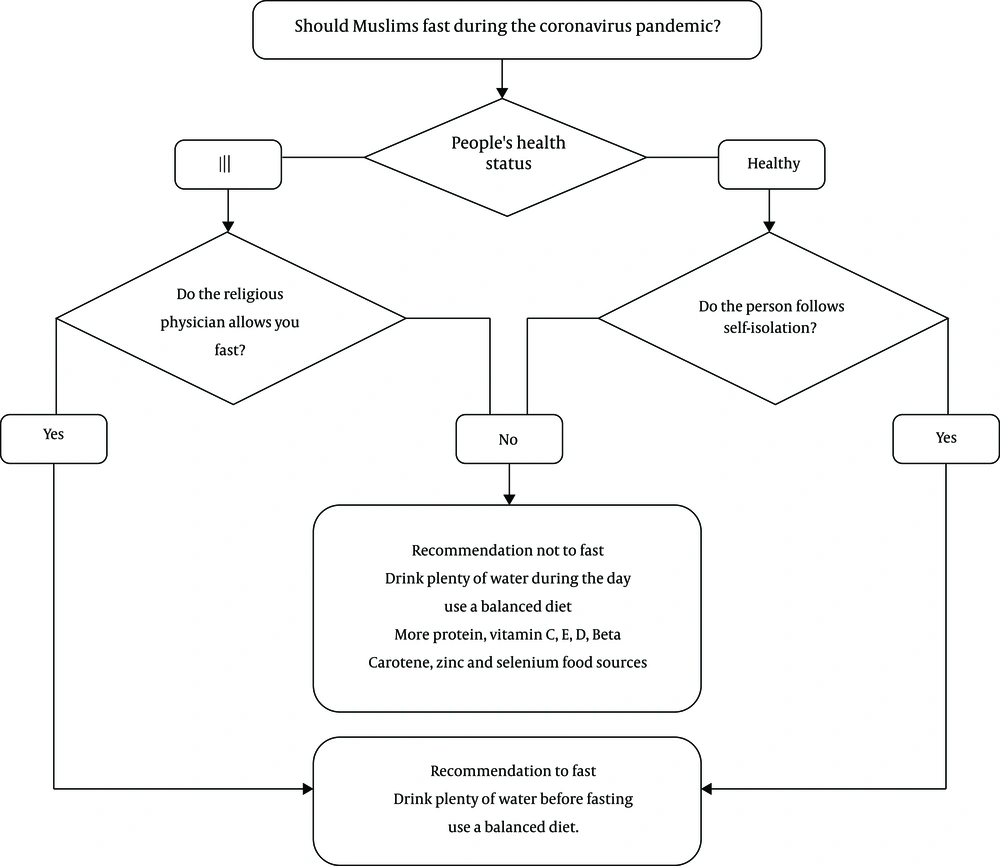Dear Editor,
Millions of Muslims live all over the world who fast during Ramadan every year. Various studies have been conducted on the impact of Ramadan fasting on different body organs reporting its positive results on health, such as a decrease in serum cholesterol and triglyceride and favorable impacts on the immune system (1).
Severe acute respiratory syndrome (SARS) coronavirus 2 (SARS-CoV-2) that caused coronavirus disease 2019 (COVID-19) outbreak has been a global concern from late 2019 due to its fast transmission and high pathologic effects (2).
Owing to the beginning of Ramadan during the COVID-19 pandemic, Muslims may worry whether the fasting increases the risk of coronavirus infection.
People can be categorized into two groups based on their health status (Figure 1). The first group consists of people suffering from a disease such as malnutrition and kidney disease. This group should not fast, according to the Islamic rules, since fasting can negatively affect their health condition. The second group is healthy people who can be divided into two subcategories, including healthy people who follow self-isolation and those who cannot obey self-isolation rules and are forced to leave home for work or other requisite activities.
Moreover, according to the results of a study published in the New England Journal of Medicine (NEJM) in 2019, intermittent fasting can improve people's health conditions (3). Moreover, the results of some studies showed salubrious effects of fasting on the immune system functions (3, 4). So, we recommend those people who can stay home during the fasting month to use a balanced diet and drink plenty of water before they start to fast to keep their bodies hydrated during the day.
Some scientists suppose that drinking plenty of water and warm liquids may prevent esophagus mucus from being infected by different micro-organisms, especially coronavirus. Although there is no strong evidence to confirm the positive effect of drinking water on preventing coronavirus infection, we recommend the group who are forced to stay out of home not to fast. People need more water as the weather is getting hot to keep their bodies hydrated. Furthermore, we recommend this group to use a balanced diet of food sources enriched with more protein, vitamin C, E, D, beta carotene, zinc, and selenium (5, 6).
Moreover, the Iranian Muslims’ religious leader said, “Not fasting during the auspicious month of Ramadan is not allowable unless an individual has a reason to believe that fasting will cause illness, intensify an illness, prolong an illness, or delay one’s recuperation. Obviously, it is enough if this conviction is obtained based on the opinion of a religious physician. Therefore, if a person has a reasonable fear of being subject to any of the above-mentioned difficulties, they should not fast, but it will be necessary to make up for these missed fasts at a later time”.
